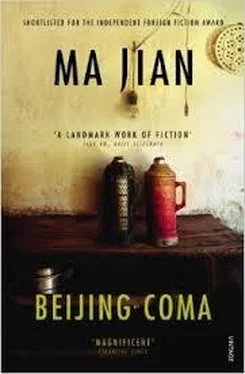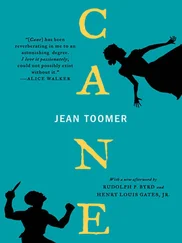‘You’re right. His nails look very strange…’
‘Can you open the window?’
‘But it’s still raining outside.’
‘It doesn’t matter. The room must be well ventilated when I transmit my qi or he won’t be able to absorb it properly.’
Master Yao holds my foot in his hand, and with his thumb makes firm, circular movements on the back of my big toe. A pain signal shoots up to my head, causing the patch of dead cells around my wound to twitch, and for a moment I see a vision of my daughter. She’s standing in the rain, clutching an umbrella with her small hands, her eyebrows exposed under her newly cut fringe.
Since Tian Yi told me about the abortion, I often imagine what my daughter might look like now, had she lived. She wouldn’t be a miniature version of Tian Yi. She would have a round face, large eyes and two small dimples on her cheeks.
‘People only care about money these days. If you don’t bribe the doctors with red envelopes of cash, they won’t bother to treat you…’
Just as Master Yao gets up to leave, Mimi and Yu Jin arrive. They’re sitting on the sofa now, talking about Tian Yi.
‘She sent me an email with lots of articles about new treatments for coma patients,’ Mimi says to my mother. ‘They’re in English, but I can translate them for you.’
‘What’s an email? Do you mean a telegram?’
‘No, it’s a letter you can send through a computer. It arrives almost instantly.’
‘How amazing. I’d like to learn how to send them.’
‘As long as you can write Chinese in the Roman alphabet, it’s very easy.’
‘If you want to learn, I’ll lend you a home computer,’ Yu Jin says. He’s sitting on my brother’s bed in the covered balcony having a cigarette. I hear him kick his short legs as he speaks. I’m terrified the balcony will collapse and he’ll plummet four storeys to the ground. My mother will never be able to learn how to use a computer. She has trouble switching on the radio sometimes. I used to spend a lot of time in the computer room at university, reading research articles stored on the large, cumbersome machines there. It’s strange to think that, just a few years on, people now have computers in their own homes.
‘Has Tian Yi got used to life in America?’ my mother asks. ‘I’ve heard Western food is very hard to digest.’
‘Foreigners are like rabbits. They like to munch on raw lettuce!’ Mimi always throws her head back when she laughs.
You want to fly through the dark like Hun Dun, the headless god who has six feet and four wings.
Mimi’s jaw dropped when she saw Sister Gao walk towards us. ‘We were told you’d been kidnapped,’ she said. ‘How did you escape?’ There was a piece of garlic skin stuck to her lip.
‘I don’t know what happened. Someone dragged me off to hospital last night and put me on a drip. Can you pass me one of those cucumbers?’
Sister Gao sat down and wiped the sweat from her face with a tissue. We were on the Monument’s upper terrace, having an early lunch.
‘Well thank God you’re here now!’ Tian Yi said.
‘The new student marshals nearly didn’t let me up here,’ Sister Gao said breathlessly. ‘None of them seemed to know who I was.’
‘You should have come up through your private entrance in the south,’ I laughed, alluding to the power she wielded in the Voice of the Student Movement’s tent.
‘A plane flew over at ten this morning and dropped a bundle of leaflets into the Square,’ Tian Yi said, then quickly put her hand over her mouth to stop herself from retching. She’d vomited twice since giving up her fast.
‘All the student groups seem to have disbanded,’ Hai Feng said. ‘There’s no one on duty at the Beijing Students’ Federation’s command centre. You lot had better take control, or we’ll be in deep trouble when the army turns up.’
I glanced over to the Federation’s command centre on the opposite side of the terrace. All I could see were a broken table and some empty cardboard boxes.
Below it, in the mid-distance, Bai Ling was leaning out of a window of the broadcast minibus, shouting, ‘Fellow students, let us devote our lives to defending our constitutional rights…’ Her mouth was too close to the microphone, so her words were muffled.
By now, we were broadcasting entirely from the minibus. We’d moved all our equipment into it, so that we could continue transmitting if the army came to drive us out. The broadcast tent was now only used for editorial work.
Zhuzi, who was sitting next to me, said that Bai Ling was a heroine, and that everyone in the Square looked up to her. But as head of security, Zhuzi was more powerful than her. He was in charge of all the student marshals in the Square as well as those guarding the major traffic routes of the city. In the event of a crisis, he would be able to take control.
‘The government has cut off the water and electricity supplies to the Square,’ Lin Lu yelled, taking the microphone from Bai Ling. ‘This is an emergency situation! Comrade workers of Beijing, we need your support!’ The white minibus then drove to the other side of the Square.
‘You must be prepared for police violence,’ I said. ‘It’s no joke being attacked with electric batons, I can tell you!’ Earlier that morning, I’d accompanied Zhuzi on a tour of the barricades that residents had put up around the city. I could still feel the sweat of fear on my back.
Mao Da passed round some bread rolls then opened a can of luncheon meat. The cucumbers hadn’t been washed, so I rubbed mine on my trousers before I took a bite. It was a delicious meal. Shu Tong had been in the Square all morning, reorganising Wang Fei’s propaganda office. He’d asked some high school teachers to help write pamphlets and articles.
The Square was filled with people again. Columns of marchers poured in from all directions, followed by open-backed trucks crammed with protestors and placards. There must have been a million people in the Square now, talking and yelling. Loudspeakers wailed in unison: ‘Oppose military control! Defend Beijing!’ The multitude of human cries rose in waves that crashed against the Monument’s central obelisk and rolled back into our ears. In this sea of noise, we had to shout to be heard.
‘It won’t be easy for the army to enter the Square,’ Mao Da said, gazing out at the vast crowd.
‘They didn’t have much problem crushing the demonstrations in Lhasa a few months ago,’ Liu Gang said. ‘God knows how many Tibetans were killed. Did you see the images of Party Secretary Hu Jintao issuing the crackdown order in his army fatigues and helmet? He looked like a little Hitler.’ He was lying on his back chomping on a cucumber, his face shaded by a straw hat. On our way to the Monument he’d told me he hadn’t slept for two days.
‘That massacre happened out in the sticks,’ Mao Da said. ‘This is Beijing. The army wouldn’t dare open fire here.’
‘Liu Gang and I saw about eight hundred riot police officers at Liuli Bridge,’ I told Mao Da. ‘They were beating up every student in sight.’
‘Tear gas is very nasty,’ Mimi said. ‘It can frighten a crowd just as much as rubber bullets.’
‘It’s a miracle no student died during the hunger strike,’ Sister Gao muttered. ‘That night in the dorm when Bai Ling announced she wanted to launch the strike, I told her that if anyone died, she’d get her head cut off.’
Yu Jin walked over. ‘We’ve received many reports. This one’s from Dabeiyao Bridge, this one’s from the Hongmiao intersection. The army has surrounded the city, from Changping District to the western suburbs.’ In his red vest and red cap he looked like a turkey. He grabbed a bread roll from Chen Di, reached for a clove of garlic, then munched a cucumber, spitting the skin onto the ground as he ate.
Читать дальше












